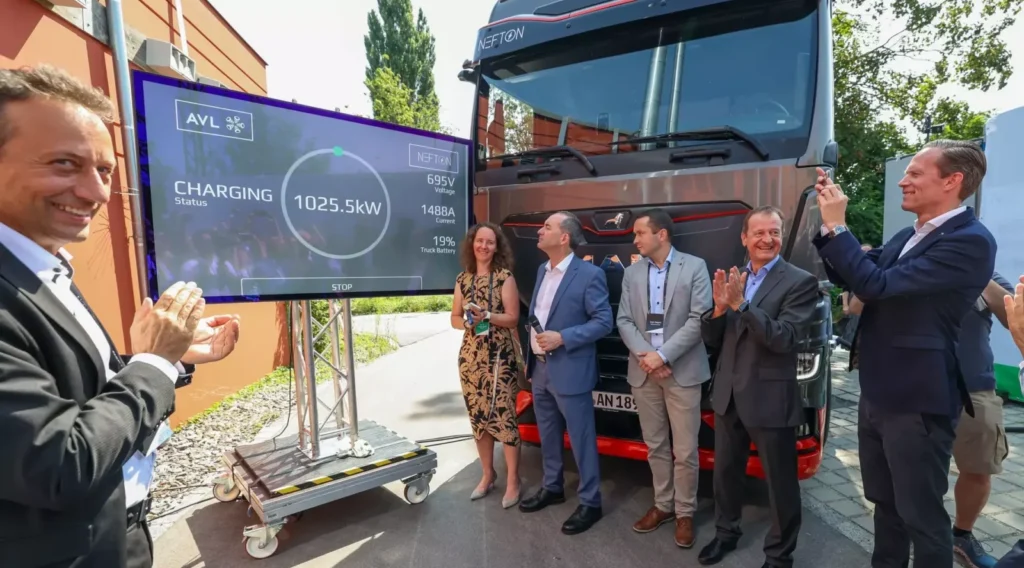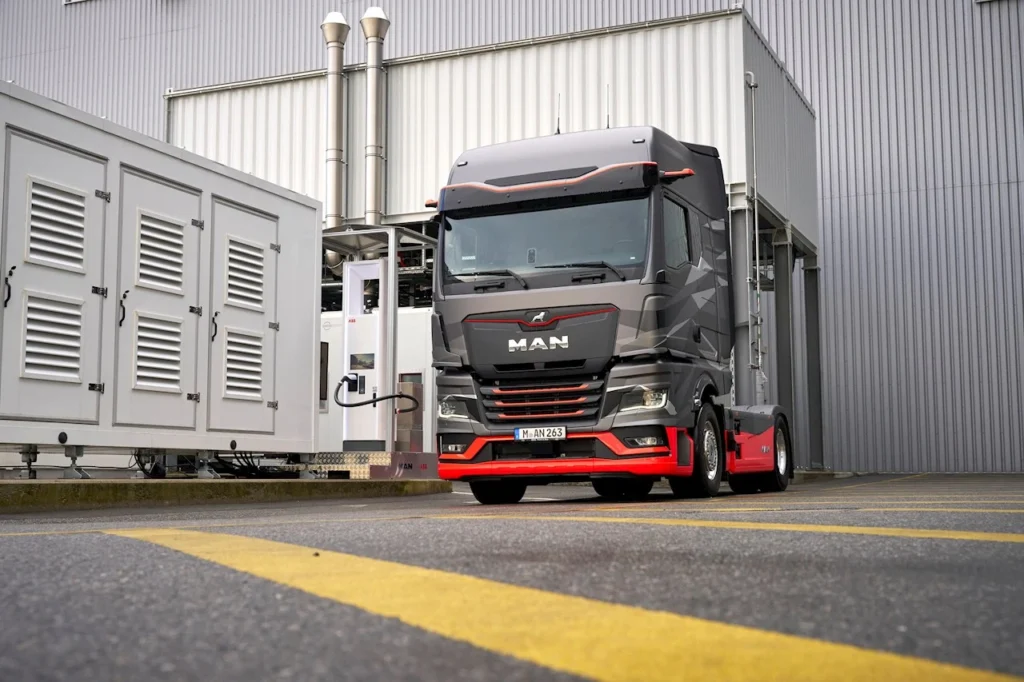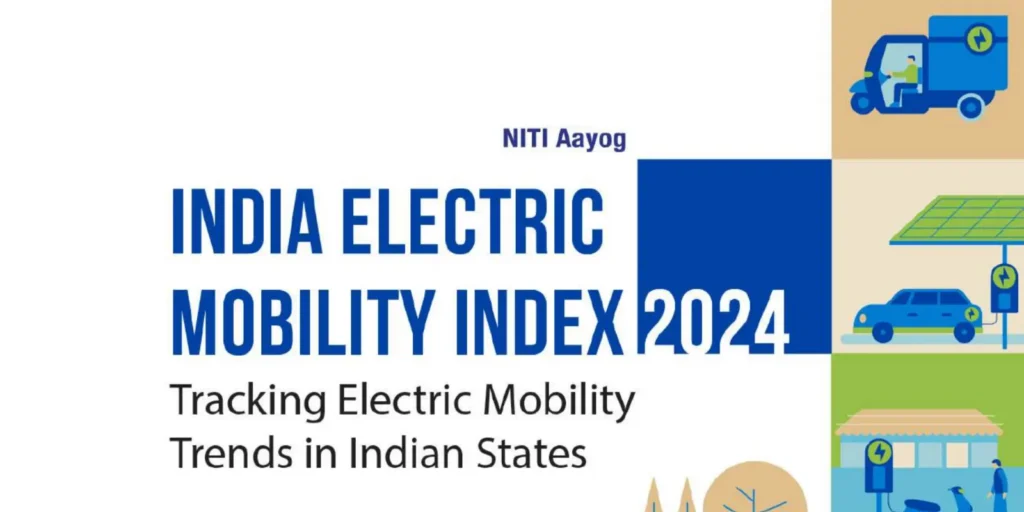
Say goodbye to long charging waits! The new megawatt charger powers up electric trucks faster than ever. This megawatt charging system charges from 10% to 80% in just 30 minutes. Read ahead…
Long-distance transportation is changing. Diesel trucks are contributing to greenhouse gas emissions and are becoming outdated. But there is a breakthrough: the world’s first-megawatt charger for electric trucks. Developed by the Technical University of Munich and its partners, the Megawatt Charger can quickly power trucks, reducing charging times and increasing their range.
The Megawatt Charging System is more than just impressive; it is a big step towards a cleaner, greener future. It will help move trucks from diesel to electric faster. The future of long-distance trucking is electric, and this megawatt charger is the key to making it happen.
Megawatt Plus e-Truck Charging Achieved
The MAN Truck & Bus demonstrated a megawatt charging prototype developed by the Technical University of Munich that pumped in more than 1,000 kilowatts to the electric truck. This prototype developed by TUM and partners as part of the NEFTON research project managed to push beyond the megawatt mark to 1,025.5 kW at 1,488 amps to add around 400 km (248.5 miles) of range to the MAN eTruck’s battery within 30 minutes.

Back in March 2024, MAN plugged one of its eTrucks into the first prototype of a Megawatt Charging System developed by ABB E-mobility. The system has the potential to ramp up to charging capacities of up to 3.75 megawatts at 3,000 amps, but was demonstrated at 700 kW at 1,000 amps at MAN’s development center in Munich to prove the technology.

By way of comparison, today’s charging stations with the CCS standard (Combined Charging System) can be used by cars and commercial vehicles and offer a maximum charging capacity of 400 kW at 500 A. The international standardisation process for the Megawatt Charging System is expected to be completed this year.
A lot of energy is needed for MCS charging. When so much electricity is flowing, the infrastructure behind the visible charging points, the grid connections and the space requirements, e.g. at motorway service stations, car parks or truck stops, play a key role. Hence, Grid expansion and the digitalisation of the grids are not only essential for the future supply of renewable energy, but also a prerequisite for the charging infrastructure.
The challenge of electrifying long-distance trucking
As the push for cleaner transportation grows, electrifying long-distance trucking faces significant hurdles. These challenges highlight the limitations and potential benefits of transitioning from diesel to electric trucks. Find some major challenges below:
Current Limitations of Electric Trucks
- Limited driving range, particularly for long-distance journeys.
- Lower payload capacity compared to traditional diesel trucks due to heavy battery packs.
- Lack of available configurations suitable for commercial and vocational fleet requirements.
Range Anxiety and Its Impact on Long-Haul Operations
- Fear of electric trucks running out of charge before reaching their destination.
- The need for frequent recharging can be inconvenient for long-distance travel.
- Extreme weather conditions and the use of energy-intensive accessories can further reduce the range.
- Restricts the ability of electric trucks to embark on long-distance journeys without the fear of running out of charge.
The first Megawatt charger revolution
The Megawatt Charging System (MCS) charges electric trucks faster than ever before. It delivers over 1000 kW of power, cutting charging time significantly. The Megawatt Charger can boost a truck’s charge from 10% to 80% in about 30 minutes. It extends the truck’s range by 300 to 400 km during breaks. This technology helps long-distance trucking by making recharging quicker and easier.
The Technical University of Munich (TUM) and industry partners developed the Megawatt Charger. Its partners include AVL Software and Functions GmbH, FfE, Fraunhofer ISE, Prettl Electronics Automotive, and Deggendorf Institute of Technology. The Federal Ministry for Economic Affairs and Climate Action funded the project, showing the value of public-private teamwork.
The scientific facts send a clear message: Battery-powered trucks have an efficiency of around 75%. This puts them far ahead of trucks powered by fuel cells with a 26% efficiency and eFuels with a 14% efficiency. However, the necessary infrastructure for the effective use of electric trucks is still lacking along the main transport routes. The technology for megawatt charging represents an enormous step forward.“
Professor Markus Lienkamp at the Technical University of Munich (TUM)
Benefits for truck operators
The Megawatt Charging System (MCS) offers significant advantages for truck operators. Megawatt Charger helps overcome range anxiety, reduces diesel dependency, and boosts operational efficiency.
Addressing Range Anxiety
The Megawatt Charger solves range anxiety by charging trucks quickly and reliably. Trucks can now travel long distances without worrying about running out of power. This technology cuts down charging downtime, making it ideal for long-haul trips.
Reducing Reliance on Diesel Fuel
The Megawatt Charger speeds up charging and reduces the need for diesel fuel. This shift to electric power helps cut greenhouse gas emissions. It contributes to cleaner air and a more sustainable future.
Improving Operational Efficiency
The Megawatt Charger makes operations more efficient by shortening charging times. Truck operators can manage fleets better and integrate the system into various settings. This reduced downtime saves costs and boosts productivity.
Potential impact and future outlook
Megawatt Charger has the potential to transform the trucking industry. It relieves range anxiety, making electric trucks more viable for long hauls and accelerating their adoption. The technology improves operational efficiency by shortening charging times, helping truck operators manage fleets better and save on costs. Its flexibility allows integration in various settings, from distribution centers to service stations.
Future advancements in megawatt charging systems may include increased power capacity, with prototypes already reaching up to 3.75 MW. Improved interoperability will enable different truck models to use Megawatt Charger, lowering costs and boosting adoption. As technology becomes more affordable, widespread deployment will support the growth of electric trucks in both urban and long-distance transportation.
The final words
The Megawatt Charging System (MCS) is set to revolutionize long-distance trucking. By charging trucks from 10% to 80% in just 30 minutes, it tackles range anxiety and speeds up operations. This breakthrough reduces reliance on diesel, cuts emissions, and promotes a greener future. The MCS, developed by the Technical University of Munich and its partners, offers significant benefits for truck operators, including improved efficiency and reduced downtime.
As technology advances, we can expect even faster charging and broader adoption. The MCS represents a major step towards transforming long-haul trucking and achieving a cleaner, more sustainable transportation system.
What is Megawatt Charging System
Read Ahead



